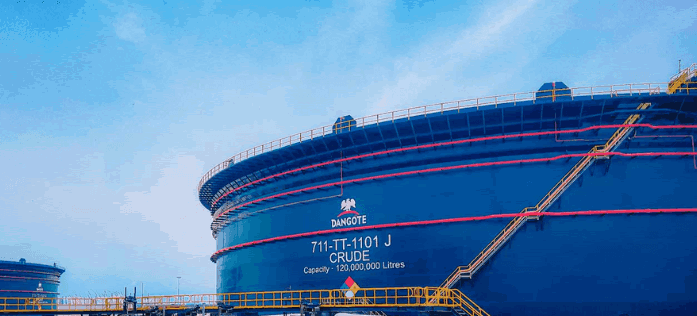The impending commencement of fuel supply by Dangote Petroleum Refinery in June is poised to reshape Nigeria’s economic landscape, potentially slashing the country’s hefty monthly fuel import bill of approximately N520 billion. Aliko Dangote, Chairman of the Dangote Group, affirmed at the Africa CEO Forum Annual Summit in Kigali, Rwanda, that the refinery’s operations would obviate the need for petrol imports starting next month.
Since President Bola Tinubu’s removal of fuel subsidies on May 29 last year, Nigeria’s petrol import volume has dwindled to an average of one billion litres monthly, as reported by the National Bureau of Statistics. Dangote’s reassurance implies a pivotal shift in the nation’s energy dynamics, as the $20 billion refinery gears up to cater to West Africa’s petrol and diesel needs, alongside the continent’s aviation fuel demand.
The projected savings from Dangote’s initiative could significantly alleviate the burden of Nigeria’s yearly N6.2 trillion expenditure on petrol imports. With an estimated monthly consumption of one billion litres and an average pump price of N670/litre, the current import bill totals approximately N520 billion per month. Dangote’s entrance into the market promises to curtail this expense, effectively trimming costs associated with shipping and other importation charges.
Moreover, Dangote’s refinery aims to bridge the gap between the landing cost and pump price of petrol, estimated at N150 per litre. This discrepancy reflects various expenses, including marine costs, Nigerian Ports Authority charges, and transportation fees from the port to filling stations nationwide.
Economically, the refinery’s operations are anticipated to bolster Nigeria’s foreign exchange reserves, with potential savings of at least $10 billion annually on fuel imports. This reduction in demand for foreign exchange would likely strengthen the naira, presenting favorable conditions for the nation’s economic growth.
While Dangote’s pledge heralds optimism for Nigeria’s energy independence, it also underscores the imperative for strategic collaboration between the government and private sector. Industry analysts advocate for a concerted effort to optimize the refinery’s local sourcing of crude oil, thereby minimizing forex outflows and maximizing economic benefits.
In anticipation of Dangote’s petrol production, fuel marketers are gearing up for negotiations aimed at securing discounted rates through bulk purchases. The Independent Petroleum Marketers Association of Nigeria is poised to engage with Dangote to explore mutually beneficial arrangements, capitalizing on the association’s extensive market reach across the country.
The impending shift in Nigeria’s fuel dynamics underscores the transformative potential of indigenous refining capacity. Dangote’s foray into petrol production not only promises economic dividends but also instills renewed confidence in Nigeria’s capacity for self-sufficiency and resilience in the face of global energy challenges.
NewsAnalytrics Analysis
Economic and Business Analysis of Dangote’s Fuel Supply Initiative
Economic Impact:
- Foreign Exchange Savings: Dangote’s commencement of petrol supply has the potential to significantly reduce Nigeria’s hefty yearly expenditure on fuel imports, estimated at around N6.2 trillion. By producing petrol domestically, the country can conserve foreign exchange reserves that would otherwise be spent on importing petroleum products. This could positively impact Nigeria’s balance of payments and strengthen the national currency, fostering economic stability.
- Reduced Dependence on Imports: Nigeria’s heavy reliance on fuel imports has long been a vulnerability, exposing the economy to fluctuations in global oil prices and supply disruptions. Dangote’s refinery represents a crucial step towards mitigating this risk by establishing local refining capacity. This shift towards self-sufficiency in fuel production enhances Nigeria’s energy security and reduces its susceptibility to external shocks in the global oil market.
- Employment Generation: The operation of Dangote’s refinery is expected to create employment opportunities across various sectors of the economy, from construction and engineering to logistics and distribution. The multiplier effect of job creation could stimulate consumer spending, boost demand for goods and services, and contribute to overall economic growth.
Business Implications:
- Market Disruption: Dangote’s entry into the fuel supply market could disrupt the existing dynamics of the industry, particularly for traditional fuel importers and marketers. The refinery’s large-scale production capacity and potentially competitive pricing may compel other players to adjust their business strategies to remain competitive.
- Negotiation Dynamics: Fuel marketers, represented by associations like the Independent Petroleum Marketers Association of Nigeria (IPMAN), are likely to engage in negotiations with Dangote to secure favorable terms for bulk purchases. These negotiations will involve discussions on pricing, supply agreements, and distribution arrangements, potentially reshaping the relationships between fuel suppliers and retailers in the market.
- Investment Opportunities: Dangote’s venture into fuel production opens up investment opportunities in ancillary industries such as transportation, storage, and retailing. Investors may seek to capitalize on the growing demand for logistics and distribution services associated with the transportation of petroleum products from the refinery to various markets nationwide.
- Regulatory Considerations: The success of Dangote’s fuel supply initiative will depend on regulatory support and adherence to industry standards. Government policies related to licensing, taxation, and environmental regulations will influence the operational framework within which the refinery operates. Regulatory stability and transparency are essential for fostering investor confidence and ensuring the sustainability of the venture.
In conclusion, Dangote’s foray into petrol production has far-reaching implications for Nigeria’s economy and the fuel supply industry. While the initiative holds promise for reducing import dependency, stimulating economic growth, and creating business opportunities, its success hinges on effective collaboration between the public and private sectors, regulatory oversight, and market dynamics. As stakeholders navigate these opportunities and challenges, the trajectory of Nigeria’s energy landscape is poised for transformation.


